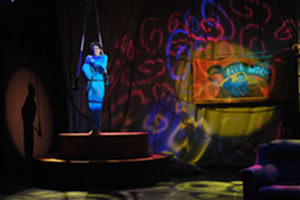Duke’s Summer Festival of the Arts comes early enough in the year to keep us from having to go “cold turkey” as the main music season draws to a close and the summer drought sets in. Thursday’s concert in Reynolds Theater was a varied and original program from the Ciompi Quartet and friends, soprano Penelope Jensen and pianist Barbara McKenzie. As our anonymous neighbor in back of us warned his companion, “Hold on to your hat. It’s all modern.” so it was. Featured were three little known and new works plus a couple of WCPE-type sweeteners, Gershwin’s “Lullaby” for string quartet and a cello and piano transcription of Granados’s “Oriental,” Spanish Dance No. 2.
The concert opened with Gershwin’s “Lullaby” for string quartet, a cloying work published posthumously with another of the composer’s “fascinating rhythms.” Like so many other ensembles we’ve heard play this piece, the Ciompi indulged in such broad rubato that in combination with the meter that it sounded as if the cradle had a wonky rocker. Difficulty getting the harmonics in tune made the performance one of the Ciompi’s less successful.
Not so for the rest of the program. Jensen joined the Quartet with two challenging works, Quartet of Songs by Caroline Mallonée, a Duke graduate student in composition, and Tryptich for High Voice and Strings by Arthur Shepherd. Mallonée’s work, written last year and based on four seasonal poems by Carl Sandburg, captured the essence of each of the seasons, especially spring in the dancing first movement “Spring Grass.” She indulged in a little old fashioned tone painting in “Summer Grass,” in which a drought is broken by pizzicato raindrops. Likewise in the third movement, “Sleep Impressions,” where the soprano is accompanied by rushing chromaticism to portray the autumn wind. These features render the work fairly accessible, despite its atonality.
Composer, conductor and music critic Arthur Shepherd (1880-1958) was for many years on the music faculty of Case Western Reserve University in Cleveland. He was an important composer in the generation that fell between the Europe-oriented Americans like Edward MacDowell and Charles Tomlinson Griffes and the founders of the American school, Aaron Copland and Virgil Thomson. His Triptych, using three poems by the Indian poet Rabindranath Tagore, is a lush lyrical work in which the singer is given the role of another instrument rather than as a soloist with accompaniment. Jensen and the Quartet blended beautifully in their interweaving lines.
Enrique Granados is the composer whose works typify Spanish folk and Flamenco music. Unfortunately because of this fact, his music is frequently used as background music for plays, films and TV shows about Spain or, for that matter, anything Hispanic. He composed the Piano Quintet in g minor, Op.49, however, with his mind on his great Germanic predecessors, especially Brahms and Schumann. This three-movement work opens with a decidedly Brahmsian texture, although without the older composer’s rich melodic and harmonic gifts. In the second movement, allegretto quasi andantino, however, Granados falls back on what he does best, capture the flavor of Spain. The third movement is a Schumann Piano Quintet knockoff-Granados just rearranged a few of the pitches from the main theme of the last movement of the Schumann and transformed them into his own rondo theme. Despite the musical paraphrasing, the movement is lots of fun, continually threatening to end, then coming up with yet another episode. McKenzie and the Ciompi played the drama for all it was worth, extending the pauses just a little between the sections just to keep the audience guessing.
The rest of this summer’s programs for the festival can be found in our calendar.











